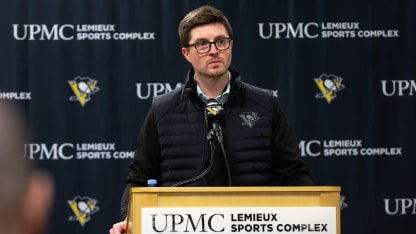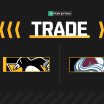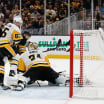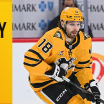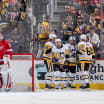With the Penguins falling short of expectations, President of Hockey Operations and GM Kyle Dubas said a lot of improvements are needed – so management entered the 2024 NHL Trade Deadline with that objective in mind.
The biggest move the Penguins made was trading Jake Guentzel to Carolina along with Ty Smith in exchange for forwards Michael Bunting, Ville Koivunen, Vasily Ponomarev, Cruz Lucius, and conditional 2024 first-round and fifth-round draft picks.
The Penguins also acquired a 2027 fourth-round draft pick from the New York Rangers in exchange for defenseman Chad Ruhwedel; acquired goaltender Ludovic Waeber and a conditional 2025 7th-round draft pick in exchange for goaltender Magnus Hellberg.
With these transactions, Dubas feels the Penguins have acquired both the salary cap flexibility and assets required to start the process of optimizing the group, while also getting a roster player in Bunting who can help the team now. He didn’t want to give a timeline on anything, saying that the goal is simply to improve the team as best they can every day.
“We're going to go into the summer now with about $12 million in cap space to improve on certain slots,” said Dubas, in his first season with the Penguins after joining the organization in June of 2023. “They don't have to be allocated to certain positions... the salary cap will be going up, too, so we'll set our plans for the summer.
“We've gotten more assets now to get involved in conversations that we couldn't get involved with when it comes to trades for younger players. That was our goal here exiting the deadline."
Dubas said the call to part ways with Guentzel, who went from a third-round draft pick in 2013 to a Stanley Cup Champion; a bonafide superstar in the National Hockey League; one of the best homegrown players in franchise history; and Sidney Crosby’s best and most consistent linemate “one of the most difficult decisions that I have had to make in my time in management.”
The trade didn’t get finalized until well after the players had left the rink following their loss to Washington, though rumors started heating up right before puck drop. Those who have known Guentzel the longest and won a Stanley Cup alongside him are trying to come to terms not only with his departure; but what it means in terms of being sellers versus buyers at the deadline.

